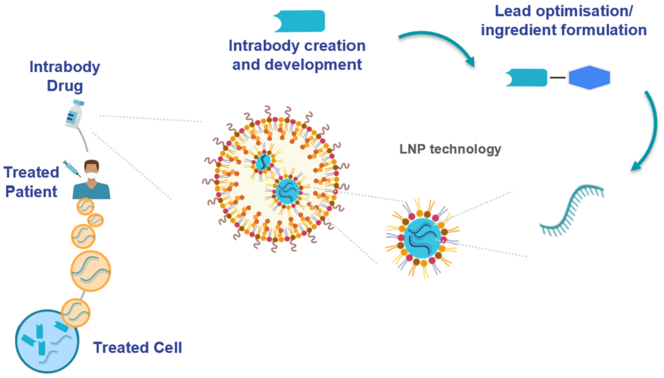Mermaid Bio GmbH of Munich, Germany, and WEHI of Melbourne, Australia, recently announced cooperation to identify and develop a unique class of therapeutic candidates that modify misbehaving proteins inside cells that can cause a variety of diseases. They are using Lipid Nanoparticle (LNP)/RNA delivery methods, which are comparable to those employed in COVID-19 mRNA vaccines, to turn sick cells into nanobody factories that can treat themselves.
 Nanobody drugs that bind to intercellular targets will be reverse translated into mRNA that will enter the patient’s cells using LNPs. Once there, the cells will produce the drugs, effectively treating themselves. Image Credit: Mermaid Bio GmbH
Nanobody drugs that bind to intercellular targets will be reverse translated into mRNA that will enter the patient’s cells using LNPs. Once there, the cells will produce the drugs, effectively treating themselves. Image Credit: Mermaid Bio GmbH
Antibodies dominate the world of extracellular disease targets. Our innovation is to combine two cutting-edge technologies to deliver therapeutics into aberrant cells, in order to treat diseases at their roots.”
Dr Ranja Salvamoser, PhD, Executive Director, Mermaid Bio
“This is an incredibly exciting approach to drug discovery. By delivering nanobodies via LNP and mRNA technology, where a single mRNA molecule can produce hundreds of copies of the encoded protein, we will solve the key challenge of using antibodies within cells,” said A/Prof James Vince, PhD, Laboratory Head at WEHI and Scientific Director at Mermaid Bio.
Protein targets linked to liver disorders and cancer will be the focus of the initial research.
LNPs, when they are injected into the bloodstream, migrate to the liver and are taken up by cells there, so choosing liver diseases is a logical starting point in the development of intracellular nanobody medicines. Major pharmaceutical companies are advancing LNP technologies, and as LNPs become more targeted in their delivery into different tissues, we will also pursue nanobody targeting of intracellular proteins throughout the body.”
Dr Ranja Salvamoser, PhD, Executive Director, Mermaid Bio
Intracellular nanobodies (intrabodies) would enable antibody-based treatments to engage with small molecule therapeutics in the treatment of intracellular illnesses. This market is expected to be worth more than $100 billion every year.
The great thing about Mermaid Bio’s approach is that this opens the door to a wide array of future disease treatments, as nanobodies can target proteins viewed as undruggable with small molecules, and can be made to specifically bind disease-causing protein variants.”
Chris Baldwin, PhD., Business Director, Mermaid Bio
“As we prove the approach, there will be plenty of opportunities for us, our partners, and our peers to develop exciting new therapeutic candidates in a broad range of therapeutic areas,” Baldwin added.
The partnership builds on WEHI’s excellent scientific research in oncology, immuno-oncology, immunology/inflammation, infectious illnesses, neurodegeneration, and rare disorders, which has a broad impact.
“We are delighted to explore our novel platform to develop novel therapeutic candidates based on molecular targets around which WEHI has specific expertise and capabilities”, said Dr Salvamoser.